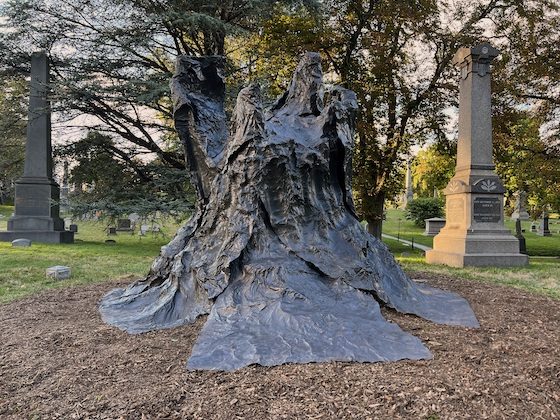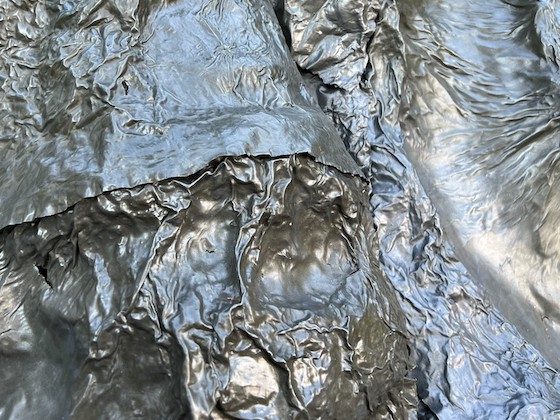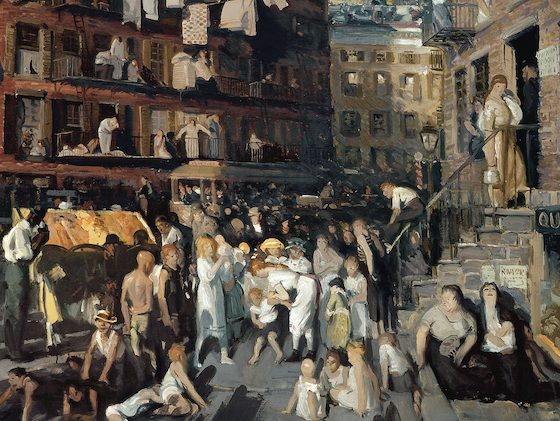The Remains of Winter
Acclaimed artist Athena LaTocha’s large-scale installation explores the history of Green-Wood’s landscape as one of continuous movement and alteration, beginning with the glaciers that shaped the land in the prehistoric era, through the Rural Cemetery Movement of the nineteenth century.
The Remains of Winter
Acclaimed artist Athena LaTocha’s large-scale installation explores the history of Green-Wood’s landscape as one of continuous movement and alteration, beginning with the glaciers that shaped the land in the prehistoric era, through the Rural Cemetery Movement of the nineteenth century.
The Remains of Winter
Acclaimed artist Athena LaTocha’s large-scale installation explores the history of Green-Wood’s landscape as one of continuous movement and alteration, beginning with the glaciers that shaped the land in the prehistoric era, through the Rural Cemetery Movement of the nineteenth century.
The Remains of Winter
Acclaimed artist Athena LaTocha’s large-scale installation explores the history of Green-Wood’s landscape as one of continuous movement and alteration, beginning with the glaciers that shaped the land in the prehistoric era, through the Rural Cemetery Movement of the nineteenth century.
The Remains of Winter
Acclaimed artist Athena LaTocha’s large-scale installation explores the history of Green-Wood’s landscape as one of continuous movement and alteration, beginning with the glaciers that shaped the land in the prehistoric era, through the Rural Cemetery Movement of the nineteenth century.
Death Cafe: The Remains of Winter Virtual Edition
This special virtual edition Death Cafe is inspired by Athena LaTocha’s The Remains of Winter, a series of site-specific sculptures about memory, mourning, and land currently on view at Green-Wood. Harry Weil, Green-Wood’s director of public programs and the show’s curator will open with a discussion of Athena’s work. To learn more about The Remains of Winter, click here. ... Read more
The Remains of Winter
Acclaimed artist Athena LaTocha’s large-scale installation explores the history of Green-Wood’s landscape as one of continuous movement and alteration, beginning with the glaciers that shaped the land in the prehistoric era, through the Rural Cemetery Movement of the nineteenth century.
The Remains of Winter
Acclaimed artist Athena LaTocha’s large-scale installation explores the history of Green-Wood’s landscape as one of continuous movement and alteration, beginning with the glaciers that shaped the land in the prehistoric era, through the Rural Cemetery Movement of the nineteenth century.
The Remains of Winter
Acclaimed artist Athena LaTocha’s large-scale installation explores the history of Green-Wood’s landscape as one of continuous movement and alteration, beginning with the glaciers that shaped the land in the prehistoric era, through the Rural Cemetery Movement of the nineteenth century.
The Remains of Winter
Acclaimed artist Athena LaTocha’s large-scale installation explores the history of Green-Wood’s landscape as one of continuous movement and alteration, beginning with the glaciers that shaped the land in the prehistoric era, through the Rural Cemetery Movement of the nineteenth century.
The Remains of Winter
Acclaimed artist Athena LaTocha’s large-scale installation explores the history of Green-Wood’s landscape as one of continuous movement and alteration, beginning with the glaciers that shaped the land in the prehistoric era, through the Rural Cemetery Movement of the nineteenth century.
The Remains of Winter
Acclaimed artist Athena LaTocha’s large-scale installation explores the history of Green-Wood’s landscape as one of continuous movement and alteration, beginning with the glaciers that shaped the land in the prehistoric era, through the Rural Cemetery Movement of the nineteenth century.
The Remains of Winter
Acclaimed artist Athena LaTocha’s large-scale installation explores the history of Green-Wood’s landscape as one of continuous movement and alteration, beginning with the glaciers that shaped the land in the prehistoric era, through the Rural Cemetery Movement of the nineteenth century.
The Remains of Winter
Acclaimed artist Athena LaTocha’s large-scale installation explores the history of Green-Wood’s landscape as one of continuous movement and alteration, beginning with the glaciers that shaped the land in the prehistoric era, through the Rural Cemetery Movement of the nineteenth century.
The Remains of Winter
Acclaimed artist Athena LaTocha’s large-scale installation explores the history of Green-Wood’s landscape as one of continuous movement and alteration, beginning with the glaciers that shaped the land in the prehistoric era, through the Rural Cemetery Movement of the nineteenth century.
The Remains of Winter
Acclaimed artist Athena LaTocha’s large-scale installation explores the history of Green-Wood’s landscape as one of continuous movement and alteration, beginning with the glaciers that shaped the land in the prehistoric era, through the Rural Cemetery Movement of the nineteenth century.
The Remains of Winter
Acclaimed artist Athena LaTocha’s large-scale installation explores the history of Green-Wood’s landscape as one of continuous movement and alteration, beginning with the glaciers that shaped the land in the prehistoric era, through the Rural Cemetery Movement of the nineteenth century.
The Remains of Winter
Acclaimed artist Athena LaTocha’s large-scale installation explores the history of Green-Wood’s landscape as one of continuous movement and alteration, beginning with the glaciers that shaped the land in the prehistoric era, through the Rural Cemetery Movement of the nineteenth century.
The Remains of Winter
Acclaimed artist Athena LaTocha’s large-scale installation explores the history of Green-Wood’s landscape as one of continuous movement and alteration, beginning with the glaciers that shaped the land in the prehistoric era, through the Rural Cemetery Movement of the nineteenth century.
The Remains of Winter
Acclaimed artist Athena LaTocha’s large-scale installation explores the history of Green-Wood’s landscape as one of continuous movement and alteration, beginning with the glaciers that shaped the land in the prehistoric era, through the Rural Cemetery Movement of the nineteenth century.
The Remains of Winter
Acclaimed artist Athena LaTocha’s large-scale installation explores the history of Green-Wood’s landscape as one of continuous movement and alteration, beginning with the glaciers that shaped the land in the prehistoric era, through the Rural Cemetery Movement of the nineteenth century.
George Bellows: The Great American Painter
George Bellows (1882–1925) has been described as "the most acclaimed American artist of his generation." In the early twentieth century, as a member of the Ashcan school of painting, he pioneered a realistic depiction of life in New York City: boxing matches, elevated trains, dock workers, and everyday people. Bellows had a short but prolific ... Read more
The Remains of Winter
Acclaimed artist Athena LaTocha’s large-scale installation explores the history of Green-Wood’s landscape as one of continuous movement and alteration, beginning with the glaciers that shaped the land in the prehistoric era, through the Rural Cemetery Movement of the nineteenth century.
The Remains of Winter
Acclaimed artist Athena LaTocha’s large-scale installation explores the history of Green-Wood’s landscape as one of continuous movement and alteration, beginning with the glaciers that shaped the land in the prehistoric era, through the Rural Cemetery Movement of the nineteenth century.
The Remains of Winter
Acclaimed artist Athena LaTocha’s large-scale installation explores the history of Green-Wood’s landscape as one of continuous movement and alteration, beginning with the glaciers that shaped the land in the prehistoric era, through the Rural Cemetery Movement of the nineteenth century.
The Remains of Winter
Acclaimed artist Athena LaTocha’s large-scale installation explores the history of Green-Wood’s landscape as one of continuous movement and alteration, beginning with the glaciers that shaped the land in the prehistoric era, through the Rural Cemetery Movement of the nineteenth century.
The Remains of Winter
Acclaimed artist Athena LaTocha’s large-scale installation explores the history of Green-Wood’s landscape as one of continuous movement and alteration, beginning with the glaciers that shaped the land in the prehistoric era, through the Rural Cemetery Movement of the nineteenth century.
The Remains of Winter
Acclaimed artist Athena LaTocha’s large-scale installation explores the history of Green-Wood’s landscape as one of continuous movement and alteration, beginning with the glaciers that shaped the land in the prehistoric era, through the Rural Cemetery Movement of the nineteenth century.
The Remains of Winter
Acclaimed artist Athena LaTocha’s large-scale installation explores the history of Green-Wood’s landscape as one of continuous movement and alteration, beginning with the glaciers that shaped the land in the prehistoric era, through the Rural Cemetery Movement of the nineteenth century.
The Remains of Winter
Acclaimed artist Athena LaTocha’s large-scale installation explores the history of Green-Wood’s landscape as one of continuous movement and alteration, beginning with the glaciers that shaped the land in the prehistoric era, through the Rural Cemetery Movement of the nineteenth century.
The Remains of Winter
Acclaimed artist Athena LaTocha’s large-scale installation explores the history of Green-Wood’s landscape as one of continuous movement and alteration, beginning with the glaciers that shaped the land in the prehistoric era, through the Rural Cemetery Movement of the nineteenth century.
The Remains of Winter
Acclaimed artist Athena LaTocha’s large-scale installation explores the history of Green-Wood’s landscape as one of continuous movement and alteration, beginning with the glaciers that shaped the land in the prehistoric era, through the Rural Cemetery Movement of the nineteenth century.
The Remains of Winter
Acclaimed artist Athena LaTocha’s large-scale installation explores the history of Green-Wood’s landscape as one of continuous movement and alteration, beginning with the glaciers that shaped the land in the prehistoric era, through the Rural Cemetery Movement of the nineteenth century.
Green-Wood’s public programs are made possible by the New York State Council on the Arts with the support of the Office of the Governor and the New York State Legislature, as well as the New York City Department of Cultural Affairs.



